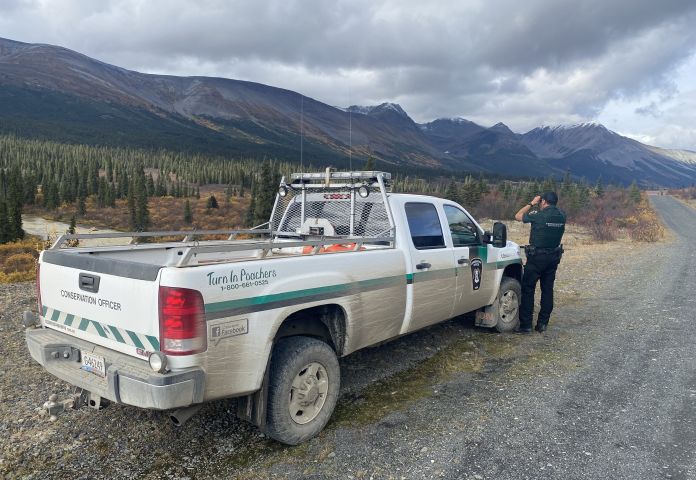What we do
The public puts a tremendous amount of responsibility and trust in conservation officers. Duties can vary significantly, but here are typical job duties for a conservation officer:
- often patrol remote natural areas to ensure their conservation and protection;
- work closely with local First Nations, renewable resources councils, partner agencies, communities and other groups;
- enforce environmental laws, including issuing tickets and summonses;
- check hunting and fishing parties for licences, bag limits and compliance with safety regulations;
- prepare files for court briefings, continuity of evidence, and consultations with the crown prosecutor;
- respond to human-wildlife conflicts, including attacks on humans;
- respond and provide assistance to other public and law enforcement emergencies;
- advise the public on safety issues, such as potentially dangerous wildlife; and
- district equipment maintenance.
Conservation officers investigate complaints of non-compliance with natural resource laws, such as:
- pollution of waters;
- destruction of fish and wildlife habitat;
- importation of endangered or non-native species; and
- poaching reports.
Pay and benefits
Recruiting process
You will need to apply through the Government of Yukon hiring process when a position becomes available. See if conservation officer jobs are available and find out about the Government of Yukon hiring process.
You may have to participate in additional screening assessments, such as a written exam or other assignments. If you are selected for an interview we will give you enough time so you can prepare and make travel arrangements if needed. We only cover expenses for travel to the interview if this is specified in the job posting.
The Government of Yukon will complete a thorough background investigation on applicants who accept a conditional offer of employment. You will need to pass a medical exam and psychological evaluation before we confirm your appointment.
We also conduct security screening. This helps us to screen out a person whose past behaviour suggests a significant risk of officer misconduct. We screen for things such as:
- dishonesty;
- substance abuse;
- violent behavior; or
- disregard for authority.
We may also do a criminal record check, driving record check and other verifications. While this process may cause you to feel some anxiety, we are not looking for a person with a perfect record. A successful candidate embodies our key values:
- integrity;
- commitment; and
- fairness.
Job requirements
To apply to be a conservation officer you must:
- be at least 19 years of age;
- have a valid Yukon driver’s licence (Class 5) or equivalent;
- have a valid Firearms Possession and Acquisition Licence;
- have valid First Aid and CPR certificates, or be able to acquire them within 3 months;
- obtain Workplace Hazardous Materials Information System (WHMIS) certification;
- successfully complete the physical abilities requirement evaluation (PARE); and
- be able to carry out the duties of an armed conservation officer.
You will also need a degree or diploma from a recognized post-secondary institution in:
- natural resources law enforcement;
- conservation and environmental law enforcement; or
- natural resource protection.
Essential experience:
- a resource enforcement-based position with experience related to investigating resource violations, laying charges and prosecution;
- effectively handling human-wildlife conflict complaints; and
- presenting information to, and/or working with boards and councils, community stakeholders or similar groups.
The following are an asset, but are not required:
- enforcement experience working in a remote community or northern setting; and
- experience working collaboratively with First Nations communities and governments.
Training
If you are successful in the recruitment process, you will have to take the Conservation Officer Basic Training. Western Conservation Law Enforcement Academy is a joint recruit training initiative of natural resource law enforcement agencies from Saskatchewan, Manitoba, Alberta, the Yukon and British Columbia. New conservation officer recruits that meet the base qualifications will spend around 16 weeks at Western Conservation Law Enforcement Academy.
Upon successful graduation from the Western Conservation Law Enforcement Academy, you will begin a 12-month new officer field training program under the mentorship of an experienced Yukon conservation officer. During this time you will apply and refine the knowledge and skills you gained at the academy. You will be a full conservation officer after successfully completing field training.
Conservation Officer Services Branch
The Conservation Officer Services Branch is a law enforcement agency dedicated to promoting safe communities. We deliver a suite of comprehensive programs and services in support of the well-being of all Yukoners in ten districts, including Whitehorse and nine Yukon communities.
Conservation Officer Services performs monitoring and enforcement, provides hunter and trapper education, provides resource management support, ensures public safety relating to wildlife and manages trapline administration.
They work together with many partners on the land to do so efficiently, including the public, law enforcement agencies, other wildlife enforcement agencies and First Nations governments.
Learn more
Become a Yukon conservation officer

